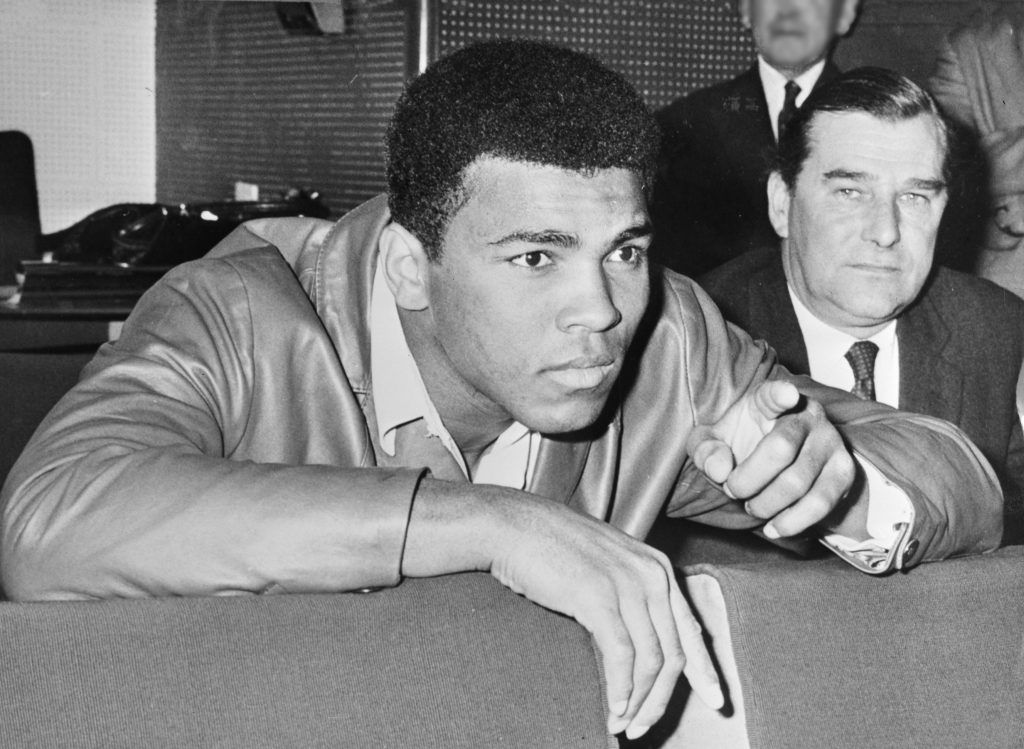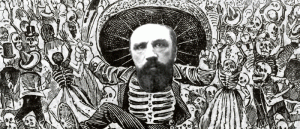We all know Muhammad Ali as the world’s best fighter in history, not only in the ring, but for racial and social justice in his life time. But while people may say his fighting career started with his first match against Tunney Hunsaker, the true start to his fighting career started with the victories of his challenges since his childhood. Before Muhammad Ali’s name was known as Muhammad, he was Cassius Clay. Growing up, Cassius struggled in school and found it hard to keep up with the other kids in his classes. He quickly became discouraged in school and found an interesting hobby when he was just a twelve-year-old boy whose bike had been stolen. His newly discovered talent for boxing had just emerged, but with so much going on, he continued in school even when his struggles were disabling. Later in life, Ali was tested for learning disabilities and was diagnosed with dyslexia, which made sense of the struggles that he faced throughout school. Learning disabilities went unrecognized due to little research, awareness, and material to treat learning disabilities.1
“As a high school student, many of my teachers labeled me ‘DUMB.’ Of course I knew who the real dummies were. I barely graduated from high school. There was no way I was going to college—I never even thought about it. I could barely read my textbooks.” – Muhammad Ali2

Lets get this straight. Having a learning disability does not mean you are dumb by any means. Did you know that Albert Einstein, Steve Jobs, Stephen Hawking, Leonardo da Vinci and many more brilliant people were dyslexic? Some of the most talented and highest achieving IQs are from people with dyslexia and other learning disabilities. So what is dyslexia? The word dyslexia originated from the Greek words dys (meaning poor or inadequate) and the word lexis (meaning words or language). Dyslexia is a learning disability that affects one’s ability to read, write, and spell, and in some cases, affects mathematical abilities. Dyslexia is strongly passed through genetic lines. 40% of boys and 20% of girls with a dyslexic parent develop the disorder. Dyslexia can occur equally in all races.3 Our public school systems are set up to teach curricula geared towards children who can handle the language, both oral and written expression, in the normal manner. Dyslexia cannot be “cured.” Dyslexic children go through the public school system not getting diagnosed, and they suffer compared to those who don’t have learning disabilities. Dyslexia is not the result of neurological damage, but the product of neurological development. It is estimated that between 5-10% of the population have dyslexia.4
Through Ali’s struggles, he took on bigger fights. He became an Olympic champion in the light heavyweight division in 1960, when he was just eighteen. By the close of the 1960s, Ali had become among the most praised men on the planet and a hero in Africa. However, his political and religious views also made him an intimidating figure, in boxing and in the press. He converted to Islam and became a Muslim in 1961. His change to Islam has to be understood in the context of segregation in America and the civil rights movement. “Cassius Clay is my slave name,” Ali explained. “I’m no longer a slave. Muhammad means ‘worthy of all praises’ and Ali means ‘most high.'” – Muhammad Ali 5 Through his new found spirituality, he did not agree with the Vietnam war and its ideals. Ali had previously failed to qualify for the U.S. Army because of his poor writing skills, but in 1966, after a revision in the law, he was drafted.6
The U.S. military drafted 2.2 million American men out of 27 million qualified to fight in the Vietnam war. Getting drafted into the Vietnam war was practically a lottery that created social and economic issues. Men between ages 18 and 26 were prime candidates for the lottery draft. Twenty-five percent of the military force was draftees. There was lots of controversy that surrounded the Vietnam war. While there were soldiers that did support the war, at least at first, to others the draft seemed to be a death sentence. Many soldiers looked to other places to exempt them from going to war, such as going to college or getting parental deferments. Some even attempted to fail aptitude tests. If you could prove you were a full-time student at a university making progress in almost any field, you could be eligible for student deferment exempting you from the draft. There were lots of reasons for the protest of the draft. The biggest was soldiers being sent to a war to fight for a cause that they did not believe in.7

On June 20, 1967, Ali was convicted by a Houston jury of a felony charge of violating the Universal Military Training and Service Act. ‘Clay’ was sentenced to five years in prison and was fined $10,000. Muhammad Ali was one of the war’s biggest protesters. Ali was stripped of his boxing license. He was now twenty-five years old and was banned from boxing at such a prime age for his career, but he fought back against his verdict. Ali and his attorneys spent the next four years appealing his case. As the Vietnam War became increasingly unpopular, Ali made speeches at school campuses, and became an antiwar and civil rights hero.8
“Either go to jail or go to the army. But I would like to say that there is another alternative. And that alternative, that alternative is justice. And if justice prevails, I will neither go to the army, nor will I go to jail.” – Muhammad Ali 9

The fight of Ali’s life was underway, and he had an army of his own to protest against his verdict and stand with him. His boxing license was granted back to him once his case was being appealed in the Supreme Court, in the case known as Clay v. United States. Ali’s “fight of the century” was underway and the heat was rising. While he may have lost after fifteen intense rounds in the ring to Joe Frazier, Ali’s first lost in his entire boxing career, he won a bigger fight. On June 28 of that same year 1971, the U.S. Supreme Court overturned his conviction for evading the draft.10
By the 1980s, Ali continued to fight for justice, and travel the world on philanthropic missions. After such an intense fighting career, Ali retired from boxing in 1981 and focused on his religious practices. In 1984, he made public his diagnosis of Parkinson’s syndrome, which some reports attribute to boxing related injuries. Ali was forty-two years old and was yet again fighting for his life.

About 1% of people over age sixty develop Parkinson’s disease. There are about 120 cases per 100,000 in population. Parkinson’s disease causes a progressive decline in movement control, affecting the ability to control initiation, speed, and smoothness of motion. Most cases of Parkinson’s disease result in sporadic mutation.11 This means that there is a spontaneous and permanent change in nucleotide sequences. Men are more likely to be diagnosed with the disease. Having a first-degree relative with Parkinson’s disease doubles the chance of one developing the disease. Some known toxins can cause Parkinsonism, most notoriously a chemical called MPTP, found as an impurity in some illegal drugs. Certain chemicals can trigger symptoms of Parkinson’s disease. Symptoms develop and make movement difficult. The most common symptom is tremors throughout the body. Physical therapy is the best treatment for Parkinson’s Disease. The therapy of the body helps loosen muscles and improves movement, but Parkinson’s disease is not curable.12

After a thirty-two-year battle with Parkinson’s disease, Muhammad Ali passed away in 2016 at the age of 74. Ali died of “septic shock due to unspecified natural causes.” The boxing legend was a Beacon of Hope. He empowered so much change and faith in his beliefs and was confident that no matter what happened, everything would be okay. His fights in the ring empowered people’s bodies and his fights for social justice fueled people’s faith. Ali was a big believer in speaking things into existence. Through all of his struggles in life, he used his strength and his faith to fight them. Later in his life, he advocated for awareness of Parkinson’s disease and dyslexia due to his daughter who was also diagnosed with dyslexia. He will forever be remembered for his political stances, incredible fighting ability, and his empowering quotes.
- Ishmael Reed, The Complete Muhammad Ali (Montréal: Baraka Books, 2015), 68. ↵
- Theresa Maher, “Muhammad Ali—Dyslexic Role Model Fought in the Ring and for Racial and Social Justice,” February 2018, RespectAbility, https://www.respectability.org/2018/02/muhammad-ali-dyslexic-role-model-fought-ring-racial-social-justice/ ↵
- The Gale Encyclopedia of Neurological Disorders, 2nd ed.), 2012, s.v. “Dyslexia” by Tish Davidson and Laura Jean Cataldo. ↵
- Reading Research Quarterly, Vol. 19, No. 4, 1984, s.v “Dyslexia: Neuroanatomical/Neurolinguistic Perspectives,” by George W. Hynd and Cynthia R. Hynd. ↵
- Kaleem Aftab, “Muhammad Ali’s Conversion to Islam Changed the World,” June 2016, Vice (website), https://www.vice.com/en_us/article/4w5gdb/muhamamd-alis-conversion-to-islam-changed-the-world ↵
- Kaleem Aftab, “Muhammad Ali’s Conversion to Islam Changed the World,” June 2016, Vice (website), https://www.vice.com/en_us/article/4w5gdb/muhamamd-alis-conversion-to-islam-changed-the-world ↵
- The Public Opinion Quarterly, vol. 73, no. 2, 2009, s.v. “The Draft Lottery and Attitudes towards the Vietnam War,” by Daniel E. Bergan. ↵
- DeNeen L. Brown, “‘Shoot them for what?’ How Muhammad Ali won his greatest fight,” June 2018, The Washington Post https://www.washingtonpost.com/news/retropolis/wp/2018/06/15/shoot-them-for-what-how-muhammad-ali-won-his-greatest-fight/ ↵
- DeNeen L. Brown, “‘Shoot them for what?’ How Muhammad Ali won his greatest fight,” June 2018, The Washington Post https://www.washingtonpost.com/news/retropolis/wp/2018/06/15/shoot-them-for-what-how-muhammad-ali-won-his-greatest-fight/ ↵
- Johathan Eig, Ali : A Life (Boston : Houghton Mifflin Harcourt, 2017), 86. ↵
- E. Ronken and G.J.M. van Scharrenburg, Parkinson’s Disease (Amsterdam ; Washington, DC : IOS Press, 2002), 17-25. ↵
- The Gale Encyclopedia of Genetic Disorders (Vol. 2. 3rd ed.), 2010, s.v. “Parkinson Disease,” by Laith Farid Gulli. ↵




40 comments
Laura Poole
Great work Audrey! This article really painted the picture of who Mohammed Ali really was not just is career. Not many people know about how he went to prison or his protesting. Not only was he an incredible boxer, he was an activist who stood up for what he believed in. He was and still is a very influential person in history for many. This legacy lives on even after his death. I can tell you put lots of work into this!
Joshua Marroquin
To start off, this was a very well written article about the famous boxer Mohammed Ali. I only knew Mohammed Ali because of his amazing boxing career and the stories I heard of him from friends and my family. I am Truley amazed of what I found out about him and the journey he took to accomplish his goals. For example, I didn’t know that he was convicted and strip of his heavy body weight title for 4 years. I am also amazed that he protested against the Vietnam War, as well as working towards helping African Americans throughout his entire carrer.
John Arnison
A Truly amazing man.
Carlos Hinojosa
Muhammed Ali was a special person that changed the world forever because like you said he was the best fighter of his time and he fought for social justice. I remember when they called him a coward since he didn’t want to fight in Vietnam since they considered it unamerican. I think I remember reading that he said it was Unamerican to even fight in Vietnam. Which honestly, he was kind of right considering what we did there.
Madeliine Bloom
I knew of Mohammed Ali by just being one of the greatest boxers of all time. Not many people knew about all the things he had to struggle with growing up. Dyslexia is one of the worst learning disabilities because there is nothing you can do about it. Being an activist for the black community and a Vietnam war protestor, he had a lot on his hand. You really informed us of all the things that he did and nobody knew about. It makes him more inspirational knowing that he went to prison for protesting something that he felt strongly about. Great Article!
Mary Belinda
My husband was diagnosed of Parkinsons disease 2 years ago, when he was 59. He had a stooped posture, tremors, right arm does not move and also a pulsating feeling in his body. He was placed on Senemet for 8 months and then Siferol was introduced and replaced the Senemet, during this time span he was also diagnosed with dementia. He started having hallucinations, lost touch with reality. Suspecting it was the medication I took him off the Siferol (with the doctor’s knowledge) and started him on PD natural herbal formula we ordered from TREE OF LIFE HEALTH CLINIC, his symptoms totally declined over a 3 weeks use of the TREE OF LIFE HEALTH Parkinsons disease natural herbal formula. He is now almost 61 and doing very well, the disease is totally reversed! (w w w. treeoflifeherbalclinic .com)
Mary Belinda
My husband was diagnosed of Parkinsons disease 2 years ago, when he was 59. He had a stooped posture, tremors, right arm does not move and also a pulsating feeling in his body. He was placed on Senemet for 8 months and then Siferol was introduced and replaced the Senemet, during this time span he was also diagnosed with dementia. He started having hallucinations, lost touch with reality. Suspecting it was the medication I took him off the Siferol (with the doctor’s knowledge) and started him on PD natural herbal formula we ordered from TREE OF LIFE HEALTH CLINIC, his symptoms totally declined over a 3 weeks use of the TREE OF LIFE HEALTH Parkinsons disease natural herbal formula. He is now almost 61 and doing very well, the disease is totally reversed! (www.treeoflifeherbalclinic.com)
Shanita Frazier
I really enjoyed this article. I never really knew much about Muhammad Ali, but after reading this article I was able to understand who he was. I was unaware that he went to prison, I thought he had a perfect life. My father use to tell me about him when I was young but I think I was too young to remember all of the details. I see that he tried his best to protest on the Vietnam War and protect African American people from discrimination. That really means alot to me. Very good article!
Carlos Serna
I believe that the story of Muhammad Ali is one to be always remembered. Not only because of his boxing career, if not because of all his accomplishments as a human being. He did his best to protest on the Vietnam War and protect the black people from discrimination. He wanted his people to be free so much, that his decisions took him to jail and he pay the debt. Ali will always be one of the best human beings and boxers in the world.
Nathan Castillo
I only knew of Mohammed Ali, but not what he did throughout his life, and this article really helped me out understand who he was. The only fact that I knew about Mohammed was that he was a boxer, but I had no idea that he had been to prison, or protested again the Vietnam war. It was truly amazing how he was known for being one of the greatest boxers in history, as well as being a civil rights activist on his own. It is a shame that he is now gone, but his legacy will live on.